Remember the perpetually sad donkey named Eeyore from Winnie the Pooh? Anyone who has had donkeys on their farms will understand where Eeyore’s loneliness came from, which to be precise is a compulsive need for companionship. At first glance, donkeys appear to be highly stoic indifferent creatures, but they do like company. Donkeys like to mingle with themselves, other farm animals, and humans, and they do show affection in ways that are familiar to us as humans.
How exactly do donkeys show affection?
Donkeys show affection by displaying proximity. They prefer to stay physically close to animals and humans they respect. In addition to this, they also communicate affection through grooming, nips, nuzzles, vocalization, and play. To raise a donkey, it is more than necessary to understand its behavioral cues and where they stem from.
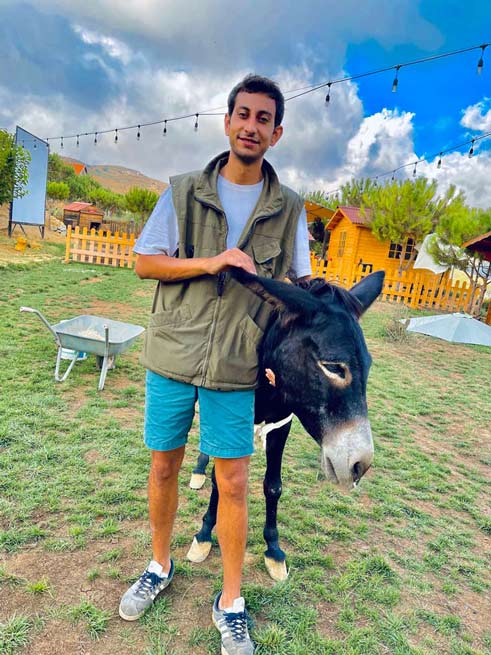
Proximity
Just like any other social animal, donkeys tend to stay physically closer to animals and humans they admire. Moreover, there are many more anecdotal cues that verify the fact that donkeys tend to become despondent when made to undergo separation from their loved ones. So if a donkey approaches you it means that it admires your company and is displaying it.
Nuzzling
Donkeys show affection by gently rubbing their head and neck against another animal, which is also called nuzzling. It is through nuzzling that donkeys display their trust and appreciation for others.
Grooming
In an attempt to show affection, donkeys use their lips and tongue to remove dust, dirt, and pests off each other, which is also called grooming. There has been enough anecdotal evidence regarding how grooming is an integral part of donkey socialization and bonding. It also helps to reduce the parasitic load on their bodies. Donkeys, generally stand parallel to each other and groom along their companion’s neck, ears, and back. They make use of their teeth and top lips in a gentle motion which tends to end up in a nip or bite.
Vocalization
It is also often noticed that when donkeys are around their friends, they communicate emotions like love and fulfillment by letting out gentle brays and soft sounds. This is how donkeys use vocalizations to show affection.
Playing together
Donkeys are often found playing with other animals as a means of displaying affection. They chase each other, nip, and wrestle each other playfully. If they have accommodated themselves with other farm animals, you will often find them playing amidst their fellow companions.
Head butting
Head butting is another body language that donkeys showcase in order to express their love and regards for each other. Head butting is simply an equivalent of a huge hug, and donkeys often practice it to communicate emotions like love, excitement, and happiness.
Looking for comfort
In case a donkey likes you, it will approach you for consolation. Donkeys seek comfort only from trusted individuals and hence it is a great indicator of their comfort level with you.
Cuddling
Another way how donkeys display affection is by leaning in for a cuddle. Even if you don’t embrace them, they may bring their head against yours. This warm gesture truly signifies that the donkey feels close to you.
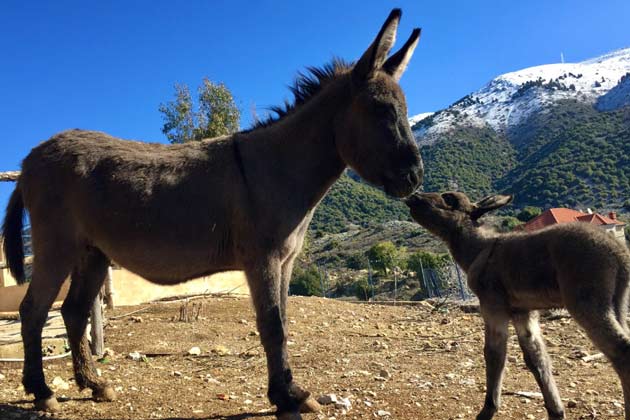
How to get a donkey to trust and love you?
Donkeys have a hard time trusting most humans and other animals in an attempt of self-preservation. Having come from the prey species, donkeys develop an inevitable need to save themselves from any of the potential threats and predators, which is why at first glance donkeys appear to be highly indifferent temperamentally.
This is why, if you aspire to have donkeys on your farm, it is necessary to understand how you can make them trust you. Following are some of the suggestions in order to combat the same.
Spend more time around and with them
Donkeys are creatures of curiosity which is why when they first meet you, it is critical to let them sniff you. This is how they try to get used to your presence and build a sense of trust around you. This helps them to feel safe and more comfortable. In addition to it, you can also carry treats for them like carrots and apples. This will be how donkeys get to attach something positive to your presence.
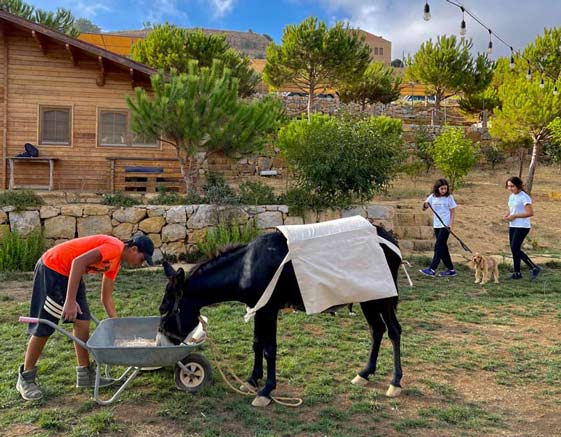
Groom them
Donkeys form social attachments to only those individuals they feel close to. To develop this sense of trust, one is suggested to spend more time grooming donkeys. It will only help in making them feel more comfortable and will also keep in check any health concerns owing to the presence of parasites on their skin.
It is also necessary for one to be mindful of the donkey’s body language. It will only help us understand if the donkey is comfortable with it or not. All of this takes time and patience, but the result is forever rewarding.
Bathe them
Another brilliant way to bond with your donkey is by giving them a bath. This enables you to spend more time with them and build a sense of familiarity. But one must also try to treat their donkey with gentleness so that it doesn’t appear like a chore.
Stay consistent
Consistency is the key when it comes to donkeys. It is best to build a routine and stick to it, or else being careless would only act as a barrier in bonding with your donkey.
Feed them regularly
Every living being needs sustenance in order to meet its nourishment requirements and it is so important to feed your donkey regularly. To feed them, it is better to build a reliable routine, so that the donkeys find it easier to trust you. On top of that, a well-fed donkey will tend to stay healthy in the long run. Like any other animal, donkeys appreciate people who feed them regularly and hence attach a sense of belongingness to them.
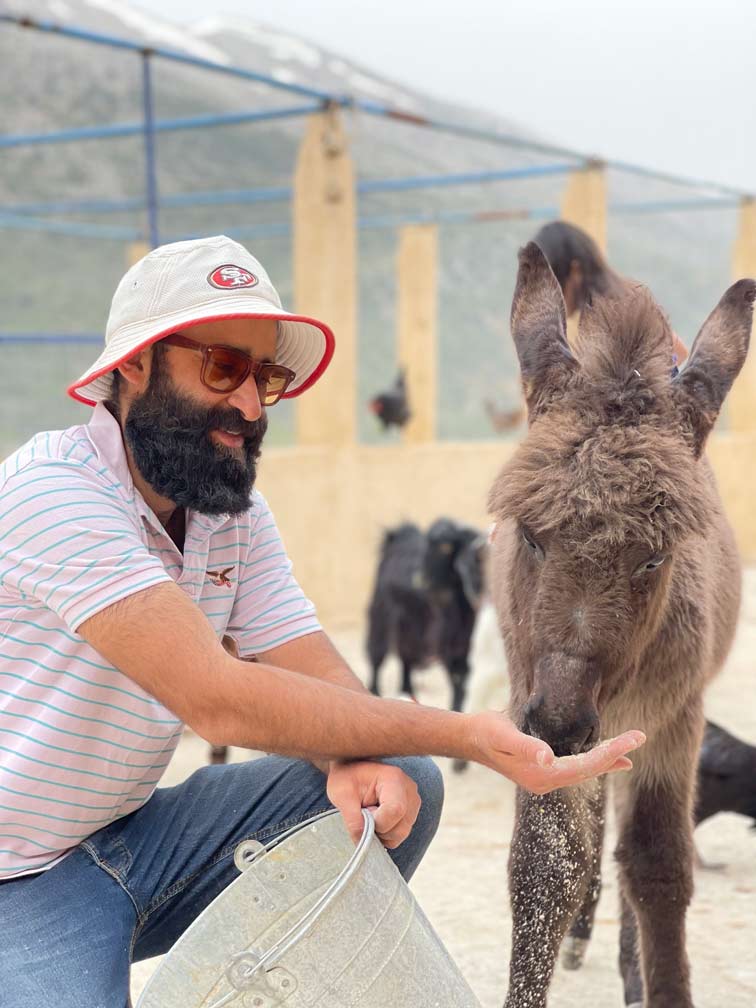
Speak to your donkey
Being highly empathetic animals, donkeys tend to pick up on verbal cues, which is why they can comprehend messages even if they don’t know the meaning of the words. Hence it is a very beneficial way to bond with your donkeys.
Train them
Another brilliant way of bonding with your donkey is by giving them a treat while training. Care must be taken to not over-feed them in the name of giving treats. Well-trained donkeys are easier to handle and they will also feel closer to you eventually.
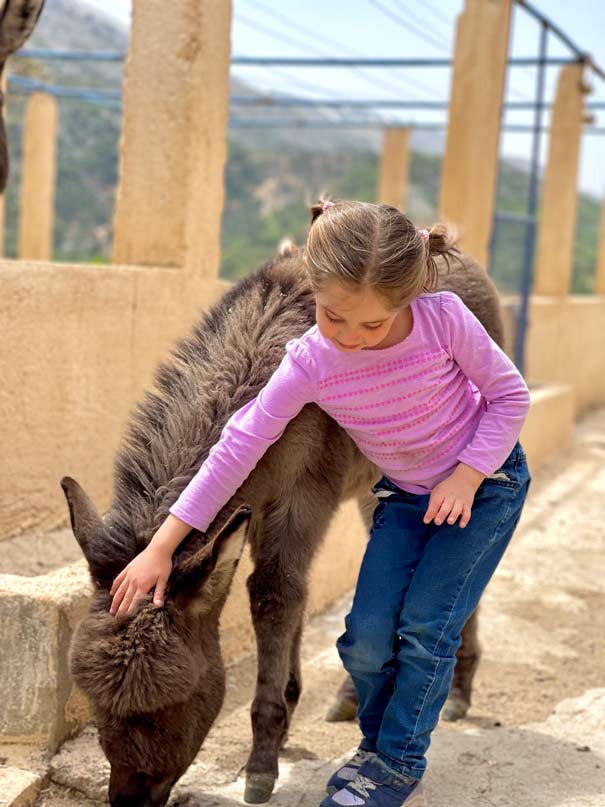
What are the factors that influence how donkeys show affection?
It isn’t surprising to find out that there are a lot of extrinsic factors that influence a donkey’s ability to trust and bond with its fellows. It shapes how they perceive threats and hence it is essential to understand these in elaboration.
Environment
The environment is always a crucial factor in determining the temperament of any animal. For example, donkeys tend to behave differently when surrounded by crowds or bullied by other animals. It is important to analyze the social hierarchy of the farm while introducing a new donkey to it.
Prior training
Donkey behavior also relies on its previous training. Its ability to comprehend tasks depend on how well it has been trained before. If it is taking time to understand the tasks, it might be because of a lack of good training.
Human handler
The expertise, confidence, and ability of the person who gets to handle donkeys tend to play a huge role in the overall development of the donkeys. It is critical for the handler to spend some time honing his/her training skills because donkeys tend to sense discomfort and lack of confidence with a lot of ease.
One needs to be mindful of how to approach a scared donkey without invading its space so that it doesn’t perceive you as a predator. Patience is the only answer when it comes to handling donkeys and hence any sort of haste or force should be avoided.
Prior experiences
Like us humans, donkeys too are a sum of their past experiences. And sometimes bad memories tend to persist longer than good ones, which is why it is better to be extremely patient and mindful if you have a rescue donkey. In such cases, it might take them a bit longer to open up and get comfortable.
Hiding pain
Donkeys are masters when it comes to concealing pain or discomfort. The handler should always be on a lookout for signs such as withdrawal from the herd, loss of appetite, or a much obvious one like hostile behavior. Keep a constant tab on your donkey’s behavior and take them to the veterinarian in case of any seemingly evident distress.
Conclusion
In a nutshell, it will be safer to assume that donkeys are highly affectionate creatures. But at the same time, this affection is not something that is granted but is earned instead. One must make an effort to educate themselves about the temperament of donkeys before handling them. It takes time but so does everything.
Photo credits: Maaser Donkey Farm, Lebanon

![How Do Donkeys Show Affection? [Plus How to Get a Donkey to Love You?] How-do-donkeys-show-affection](https://donkeyonfarm.com/wp-content/uploads/2022/08/How-do-donkeys-show-affection.jpg)

![Do Donkeys Laugh? [Plus Why Do They Do It?] do-donkeys-laugh](https://donkeyonfarm.com/wp-content/uploads/2022/08/Why-do-donkeys-laugh-270x180.jpg)
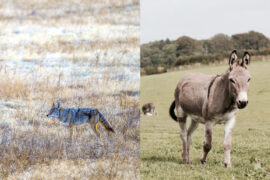
![Do Donkeys Make Good Pets? [Plus What to Know Before You Get One] Do-Donkeys-Make-Good-Pets](https://donkeyonfarm.com/wp-content/uploads/2022/05/Do-Donkeys-Make-Good-Pets-270x180.jpg)
![Are Donkeys Dangerous to Dogs? [Plus How to Keep Your Dog Safe] Are-Donkeys-Dangerous-to-Dogs](https://donkeyonfarm.com/wp-content/uploads/2022/07/Are-Donkeys-Dangerous-to-Dogs-270x180.jpg)